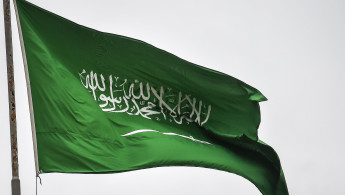Angry Saudi public calls for expulsion of UAE from Yemen coalition after 'betrayal' in Aden
Twitter users demanded action from Riyadh after UAE forces bombed positions belonging to Yemen’s Saudi-backed national army this week, prompting a backlash from President Abedrabbo Mansour Hadi himself.
Activists said it was necessary to break up the partnership with the UAE and refrain from remaining silent on its abuses against the kingdom and the Yemen government.
Under an Arabic hashtag translated to “the expulsion of the UAE is a national demand”, users from Saudi Arabia slammed the UAE as traitors.
Twitter Post
|
Translation: The UAE did not go to Yemen to liberate it, but to occupy its islands and ports. It did not treat Yemenis as partners but as followers. It did not support legitimacy but support separatists. It did not guarantee the unity of Yemen but divided it. It has not reinforced security but rather chaos through the assassination of anyone who rejects its crimes.
Twitter Post
|
Translation: The UAE plays the role of the Houthis in the south, in line with Iran's agendas, serving it more clearly in Yemen and across the region. The continuation of UAE's alliance means that Iran will continue its war against Yemen.
Twitter Post
|
Translation: The United Arab Emirates must be declared an occupying power and it must be resisted until every Emirati soldier leaves Yemeni.
Twitter Post
|
Translation: The expulsion of the UAE is no longer a call from the people but an official demand.
Twitter Post
|
Translation: Be warned from the traitors, betrayal runs in their blood.
The criticism came as deadly clashes saw an uptick in violence in the south of Yemen, including Aden where both camps are vying for power.
President Hadi had himself called on Saudi authorities to take action after the UAE had confirmed airstrikes in Aden, labelling soldiers from Yemen’s national army as “terrorist militias” amid heightened tensions between the allies.
Meanwhile, rallies in Yemen's third city Taiz gathered to protest the UAE's activities in the south, calling for its forces to withdraw from the country.
Twitter Post
|
The UAE’s foreign ministry statement late on Thursday confirmed "precise and direct airstrikes" on Wednesday and Thursday hit militias in the interim capital Aden, where UAE-backed separatists and Yemen’s government have been vying for power for several weeks.
The Abu Dhabi statement claimed the militias had planned to target a Saudi-led military coalition, of which the UAE is a key member, backing the Yemen government against Houthi rebels.
The UAE said it acted in "self-defence" after attacks by "armed groups affiliated with terrorist organisations".
"The military operation against the terrorist militias was based on confirmed field intelligence that the militias prepared to target the coalition forces - a development which required a preemptive operation to avert any military threat," it said.
"The strikes against the Arab Coalition were launched by armed groups affiliated with terrorist organisations. These armed groups attacked the Arab Coalition at Aden Airport, causing two injuries to the coalition forces," said the statement which was carried by the Emirates' official WAM news agency.
Comment: How Yemen's southern separatists mirror their authoritarian Emirati backers
The UAE accusation risks straining an already complex conflict in Yemen.
Yemen’s President Abedrabbo Mansour Hadi, who has been located in Riyadh since the early days of the conflict, slammed the UAE’s activities in the south of the country.
"We were shocked by the UAE's air raids against citizens and members of our national army amid populated neighbourhoods across the temporary capital Aden, which led forces to withdraw from the Aden province," the Yemeni presidency said in a statement on Thursday.
Hadi said he directed "the government of all its institutions to take all necessary measures at various levels to face this blatant targeting", against the country, as well as its “unity and territorial integrity."
"We have not been intimidated by the weapons and arsenal of Iran and its militias, nor will we be intimidated by fighter jets targeted on our land," the Yemeni president vowed in a statement, referencing the Iran-aligned Houthi rebels.
He urged the UAE's key ally Saudi Arabia "to intervene to stop this blatant intrusion by these militias and their aerial bombardment of our armed forces", the statement said.
Abu Dhabi has trained and supported secessionists who seek an independent southern Yemen, despite being a key pillar in the coalition backing the government against the Houthi rebels.
The statement came hours after the Emirati-backed separatists regained control of Aden on Thursday, forcing government troops who had entered the city a day early to withdraw, officials on both sides said.
The government on Wednesday said it had seized back Aden from separatists who captured the strategic city on August 10 after a fierce battle that left at least 40 people dead.
The fighting has opened a new front in a complex war that has already claimed tens of thousands of lives and sparked what the United Nations calls the world's worst humanitarian crisis
The coalition intervened in the war in 2015 in support of the government after the Houthis swept south from their northern stronghold to seize the capital Sanaa and much of Yemen - the Arab world's poorest nation.
Follow us on Twitter: @The_NewArab





 Follow the Middle East's top stories in English at The New Arab on Google News
Follow the Middle East's top stories in English at The New Arab on Google News


